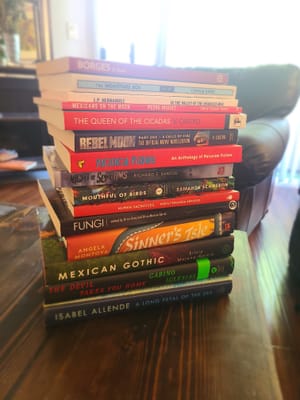By A.P. Thayer
CW: Racist slurs.
Hispanic Heritage Month is upon us and I am once again struggling with identity. What does it mean to be Hispanic and where do I fit within the speculative fiction community?
It’s been a long journey of self-discovery for me and I feel like I’m nowhere near the end of it, but the progress I’ve made the last few years has been heartening in some ways, and depressing in others. In government documents, I mark myself as Hispanic and mixed race. As I’ve changed and the world has changed, I’ve seen terms like Chicanx and Latinx come and go, too, but in my author bios, I now say I am Mexican-American or Latine.
But let’s start with Hispanic.
I didn’t consider myself one until two events in my freshman year of college. One was benign. The other not so much.
The benign one happened when I was applying for private schools and I encountered that oh-so-confusing question: What ethnicity are you?
Even then I knew I was a mix and marked the boxes for white and Hispanic. But I wondered, shouldn’t I also check Native American? Or should I just leave it as mixed race? Are not the indigenous people of Mexico exactly that, natives to the continent of America?
I left it as white and Hispanic.
The second time I encountered my Hispanicism occurred as I was heading to football practice with two friends. One was my roommate at the time—a Puerto Rican from the Bronx we’ll call Christian—and the other a hyperactive white kid from Brooklyn we’ll call Wallace whose favorite thing to do was piss people off.
We were messing around on the quad doing the usual 13-year-old crap as we trekked to the gymnasium when Wallace called us spics. He immediately took off running and Christian chased after him. Within a few yards, Christian had knocked Wallace down and was on top of him, punching him in the shoulder to give him a dead arm.
I had no idea what had just happened.
“What’s that mean?” I asked when I caught up.
“It’s like the N-word for us,” replied Christian while still punching Wallace.
“Yeah,” said Wallace. “HiSPanIC.” The emphasis was clear.
Chris looked at me expectantly while I processed what he’d just said.
Us.
Until then, the only “us” and “them” I’d experienced was being one of very few Americans in a school of Spaniards, Scots, or Austrians. That “us” made sense to me. I was from another country. Another continent.
This “us” was different. It was loaded. We were all Americans, but we were not the same. Without understanding the full magnitude of the name I’d just been called, the history behind it, or even what Hispanic meant, I hit Wallace in the shin with my razor scooter. We laughed it off and went to practice.
I hesitate to use that term—“us”—when writing this series on the state of my people’s community in speculative fiction. I’m not even going to use that dreaded term Hispanic, but Latine, instead—another divisive term (depending on who you ask). “Us” highlights the dichotomy. It shines a light on “the other.”
On the one hand, we are different. We are the other.
But as I noticed on the two Latine-focused panels I’ve been a part of in the last couple years, we are not the same. We are expected to be a monolith and yet even experiences between a Mexican and a Chicano are vastly different, never mind between myself and a Brazilian. But we’re just supposed to exist as one?
This series will tell some hard truths about being Latine in speculative fiction spaces and offer suggestions for a path forward, not just for inclusivity within science fiction, fantasy, and horror, but for enrichment.
And who am I to give my opinion on this? This first part of the series will serve as an introduction not because I consider myself the utmost expert on all things Latine, but because as a member of it, I can show you just how different we are.
I am a queer Mexican-American living in Los Angeles, but I don’t have the same experiences as the next queer Mexican-American living in Los Angeles. I was raised by a Mexican mother and American father while moving around Europe. I grew up far away from my mom’s side of the family in Guadalajara and haven’t visited in over twenty years. I had no exposure to Chicano life in Los Angeles. I don’t know what it’s like to live in East LA. The only Mexican heritage I was exposed to was what my mother could teach me while substituting lemons for limes in her guacamole and using dried beans brought over by family members when they visited us.
As an adult and writer, I’ve had to work to connect with my heritage. Settling in Los Angeles has helped. These past 15 years here have allowed my Mexican side to flourish. Living somewhere Latin Americans surround me and where I can get amazing Mexican food at any time has been a big part of my journey. But so has seeing how Latine people are treated in the speculative fiction community.
It’s because of this growth that I worked as a first reader and editor for Constelación. I was a guest editor for Tree & Stone Magazine’s first Latine-only issue of Para el Pueblo. I translated work from English to Spanish for the Los Suelos multimedia anthology project and finally felt comfortable representing my people in my own writing. I moderated a panel on The State of Latinx SFF for Flights of Foundry and was on the virtual panel Latin American Folklore in Horror for StokerCon.
In the beginning, I asked myself if I belonged in these spaces as anything more than an American, white man. I spoke Spanish, but I didn’t consider myself Mexican enough to represent the Latine community in these spaces. What if I misrepresented Latine folk?
I had to get rid of the monolith mindset ingrained within me, too.
Nowadays, I’m just glad I get to add a tiny voice in the massive chamber where Latine folk get mostly ignored. There’s no one way to be Latine, after all. It’s not my duty to represent all of Latinidad, but to represent myself.
That’s why I’m writing this piece for Frivolous Comma. I’ve spent years talking to my fellow Latine writers and the story is always the same. What can we do so people take notice of us? What can we do to pool resources so we can make an impact? The talk usually ends up at anthologies and guest editing an issue for an SFFH magazine.
And in the meantime, the publishing industry remains mostly unchanged.
Here are some of those hard truths I warned you about:
The first Latine winners of a Bram Stoker award were Cynthia Pelayo and Gabino Iglesias in 2022.
Silva Moreno-Garcia was nominated for a Nebula in 2019 for Gods of Jade and Shadow and in 2020 for Mexican Gothic, but no Latine person has won the award.
Los Angeles and San Diego get their own HWA chapters. All of Latin America is grouped into a single chapter. There are only seven of us in the WhatsApp group chat.
Constelación didn’t last a year. Para el Pueblo never got a second issue.
I say these hard truths not to shame anyone or call anyone out. I’m not here to dwell on the past. I’m saying these things because these are facts that need to be collated together so we can look to the future. If there has been any movement in Latine speculative fiction, it is slow and inadequate.
Here’s another hard truth: Without a more active effort from both within and without the Latine community, speculative fiction representation will stagnate, Latine work will continue to be ignored, and we will continue to be used as a diversity checkbox.
In horror, we are currently seeing a rise in the popularity of Latine work. Authors like V. Castro, Pedro Iniguez, Gerardo Sámano Córdova, Agustina Bazterrica, L.P. Hernandez, and Fernanda Melchor, to name but a few, are pioneers in this genre (some will argue their works aren’t horror but I won’t get into semantics in this article).
Now is the time for us to capitalize, to ride this wave into a more permanent position in the Latine speculative fiction space.
As you’re reading this, you’ve seen me use “us.” If you feel that “us” doesn’t include you, now’s your chance to be an ally and join the bigger “us” of speculative fiction in general. I’ll have things to say, after all, for writers, readers, editors, and agents.
I think about “us” at times like these, before Hispanic Heritage Month, and I think about Christian. A New Yorker who barely understood Spanish, who I had so little in common with, who ended up being the closest member of “us” I had during those formative years. I wonder how his relationship with his identity is these days.
In part two of this series, I’ll talk about what’s worked, what hasn’t, and where we, the Latine community, are in the speculative fiction conversation. In part three, I’ll talk about what needs to be done, both by the speculative fiction community at large and by Latine-identifying members of that community, to see real change.
I’m looking forward to getting into it with you.

